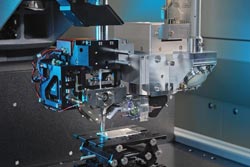Industry and research join forces to improve bonding processes in the automotive industry

Laser-guided bonding head<br>Source: Fraunhofer ILT, Aachen, Germany<br>
The quality of these bonded connections is one of the main factors that determines the reliability and availability of drive systems in electric vehicles, and hence constitutes a major design challenge for German auto manufacturers aiming to electrify their vehicles.
Now the partners participating in the RoBE (Robust Bonds in Electric Vehicles) collaborative research project have developed a reliable means of predicting the service life of these bonded connections, and also developed an alternative bonding technique based on laser micro welding that is ready for industrial implementation.
The new technique opens up a wider range of options for the use of wire bonding, especially in applications requiring the joining of copper. Here, modern laser sources with a very high beam quality ensure precise, reproducible weld joints in copper and aluminum. Through the additional use of oscillation welding in combination with adapted design of the wire and ribbon joining zones, the strength of the joint can be improved still further. By comparison with conventional wire bonding, this process offers a higher surface quality and requires less cleaning. Moreover, the process is less dependent on the nature of the underlying surface or the vibration characteristics of the workpiece.
A standard bonding machine was adapted to allow the laser bonding process to be combined with traditional bonding technologies. The new machine now allows the use of a laser in the bonding process. The main applications of this system include ribbon bonding on DCB substrates and copper terminals in the packaging of power electronics assemblies.
Advances in the field of wire bonding technologies that extend the range of design opportunities while at the same time reducing costs are a vital factor in Germany’s future as a leading provider of electromobility solutions. For this reason, since August 1, 2011 the German Federal Ministry of Education and Research (BMBF) has set aside €4.96 million in funding to support this collaborative project as part of its ICT 2020 initiative in the category “Key technologies for electromobility” (STROM).
Contacts
Dr. Alexander Olowinsky
Head of the Micro Joining Group
Phone +49 241 8906-491
alexander.olowinsky@ilt.fraunhofer.de
Dipl.-Ing. Benjamin Mehlmann
Micro Joining Group
Phone +49 241 8906-613
benjamin.mehlmann@ilt.fraunhofer.de
Fraunhofer Institute for Laser Technology ILT
Steinbachstraße 15
52074 Aachen, Germany
Media Contact
More Information:
http://www.ilt.fraunhofer.deAll latest news from the category: Automotive Engineering
Automotive Engineering highlights issues related to automobile manufacturing – including vehicle parts and accessories – and the environmental impact and safety of automotive products, production facilities and manufacturing processes.
innovations-report offers stimulating reports and articles on a variety of topics ranging from automobile fuel cells, hybrid technologies, energy saving vehicles and carbon particle filters to engine and brake technologies, driving safety and assistance systems.
Newest articles

Bringing bio-inspired robots to life
Nebraska researcher Eric Markvicka gets NSF CAREER Award to pursue manufacture of novel materials for soft robotics and stretchable electronics. Engineers are increasingly eager to develop robots that mimic the…

Bella moths use poison to attract mates
Scientists are closer to finding out how. Pyrrolizidine alkaloids are as bitter and toxic as they are hard to pronounce. They’re produced by several different types of plants and are…

AI tool creates ‘synthetic’ images of cells
…for enhanced microscopy analysis. Observing individual cells through microscopes can reveal a range of important cell biological phenomena that frequently play a role in human diseases, but the process of…





















